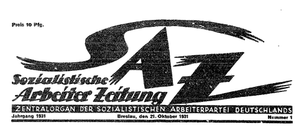 Header of SAZ, October 21, 1931 issue Header of SAZ, October 21, 1931 issue | |
| Type | Daily |
|---|---|
| Editor-in-chief | Max Richard Kleineibst (1931–1932), Walter Fabian (1932) |
| Founded | October 21, 1931 (1931-10-21) |
| Political alignment | Socialism |
| Language | German language |
| Ceased publication | 1933 |
| Headquarters | Breslau, Berlin |
| OCLC number | 730049418 |
Sozialistische Arbeiter-Zeitung ('Socialist Workers Newspaper', abbreviated SAZ) was a daily newspaper published in Germany between 1931 and 1933. SAZ was the central organ of the Socialist Workers Party of Germany (SAPD).
Foundation
The first issue of SAZ was published on October 21, 1931. The decision to launch a daily newspaper for the party had been taken at the founding conference of SAPD. The newspaper initially published from Breslau (present-day Wrocław). During this period it consisted only of 4 pages, and despite the label 'central organ' it was effectively a local Breslau publication of low quality. It carried the by-line 'Daily Newspaper of the Socialist Workers Party of Germany'. Max Richard Kleineibst was the founding editor-in-chief of SAZ. Kleineibst had previously been the editor of the Social Democratic organ in Löbau, Volkszeitung für die Oberlausitz.
Move to Berlin
On November 1, 1931, the newspaper was moved to Berlin. During this period the newspaper was published daily (except for Mondays) and contained at least 8 pages. Apart from SAZ SAPD produced a number of a weekly newspapers, Die Fackel ('The Torch', later renamed Sozialistische Wochenzeitung, 'Socialist Weekly' and Kampfsignal, 'Signal of Struggle'), a theoretical magazine Klassenkampf ('Class Struggle') and the weekly Das Volksrecht ('The People's Right').
Five-day ban
On June 25, 1932, a five-day ban on SAZ was issued, for having 'insulted' the President of the Reich.
Shift to Breslau
Moreover, in late June 1932, following a conflict inside the party, SAZ moved back to Breslau with a new, more leftist, editorial team. Kleineibst and Dora Fabian were fired from the editorial team, due to 'right-wing deviation'. Walter Fabian was named as the new editor-in-chief of SAZ. Kleineibst would be named foreign editor of SAZ.
Editors
Editors of SAZ (in different periods) also included Roland Beutner, Herbert Duckstein, August Enderle, Karl Frank, Paul Frölich, Lehmann, Rodominski, Will Schaber, Heinrich Ströbel and Klaus Zweiling. The young Herbert Frahm (later known as Willy Brandt) wrote articles in SAZ (including sharp criticisms of SPD).
References
- ^ Cliff, Tony. The Darker the Night the Brighter the Star 1927–1940. London : Bookmarks, 1993. p. 143
- ^ Rister, Herbert. Schlesische Periodica und Serien: ein Beitrag zu einem Verzeichnis deutscher, polnischer, tschechischer und wendischer (sorbischer) Adreßbücher, Almanache, Berichte, Jahrbücher, Kalender, Schriftenreihen, Schulschriften, Zeitschriften und Zeitungen über Schlesien und seine Grenzgebiete. Wiesbaden: Harrassowitz, 1975. p. 1023
- Brinson, Charmian. The Strange Case of Dora Fabian and Mathilde Wurm: A Study of German Political Exiles in London During the 1930s. Berne: P. Lang, 1997. p. 118
- ^ Drechsler, Hanno. Die Sozialistische Arbeiterpartei Deutschlands (SAPD); ein Beitrag zur Geschichte der deutschen Arbeiterbewegung am Ende der Weimarer Republik. Meisenheim am Glan: A. Hain, 1965. p. 171
- ^ Strauss, Herbert A., Werner Röder, Belinda Rosenblatt, Hannah Caplan, Sybille Claus, and Beatrix Schmidt. Biographisches Handbuch Der Deutschsprachigen Emigration Nach 1933 = International Biographical Dictionary of Central European Emigrés 1933–1945. München: Saur, 1980. pp. 369-370
- Osterroth, Franz, and Dieter Schuster. Chronik der deutschen Sozialdemokratie, Vol 1. Berlin: Dietz, 2005. p. 370
- ^ Kerbs, Diethart. Berlin 1932: das letzte Jahr der ersten deutschen Republik : Politik, Symbole, Medien. Berlin: Ed. Hentrich, 1992. p. 60
- Neumann, Sigmund. Die Parteien der Weimarer Republik. Stuttgart: Kohlhammer, 1968. p. 120
- Osterroth, Franz, and Dieter Schuster. Chronik der deutschen Sozialdemokratie, Vol 1. Berlin: Dietz, 2005. p. 388
- Gerhardt, Volker. Anfänge der DDR-Philosophie: Ansprüche, Ohnmacht, Scheitern. Berlin: Links, 2001. p. 367
- Koszyk, Kurt. Zwischen Kaiserreich und Diktatur; die sozialdemokratische Presse von 1914 bis 1933. Heidelberg: Quelle & Meyer, 1958. p. 249
- Donat, Helmut, and Karl Holl. Die Friedensbewegung: organisierter Pazifismus in Deutschland, Österreich und in der Schweiz. Düsseldorf: Econ Taschenbuch Verlag, 1983. p. 106
- Koch, Peter, and Klaus Körner. Willy Brandt: eine politische Biographie. Berlin: Ullstein, 1988. p. 64
- German-language newspapers
- Defunct newspapers published in Germany
- Newspapers published in Berlin
- Mass media in Wrocław
- Daily newspapers published in Germany
- Newspapers established in 1931
- Publications disestablished in 1933
- Socialist newspapers
- 1931 establishments in Germany
- 1933 disestablishments in Germany